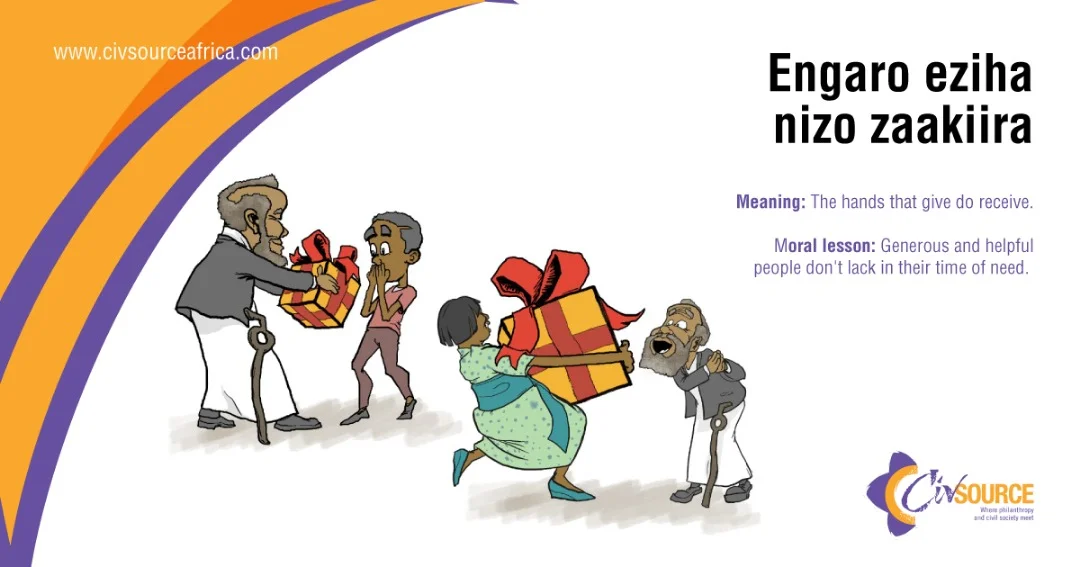In the months just after CivSource was born, one of the things we were clear we wanted to do was to understand and tell the story of giving in Africa broadly and in Uganda in particular, since that’s where we are located.
A lawyer by profession, I had been taught and had observed how most things African were relegated and treated as less than Western expression of the same notions or practices. So, for example, even while Africans have married for as long as human life existed, when the colonialists came, they claimed that the church marriage was superior to our customary ways of marriage. Soon, our laws reflected this ideology until 1976, when through the Customary Marriage Registration Decree, customary marriages were given the same legal status and recognition, as church marriages.
It also happened that through our land laws, customary tenure was, for the longest time, considered a lessor form of tenure than the British tenure forms of freehold and leasehold.
I started seeing this same narrative applied to African ways of giving. Ours was called ‘mere charity’ and not strategic. I heard people say, “Africans give to needs not causes.” “Africans don’t give to social justice”. What I heard in these statements was that African giving was not as important as giving done by the Global North. What we received from them was termed philanthropy and by inference there was/is little or no philanthropy in Africa.
And so we set out on a quest, through our flagship program called Omutima Omugabi (A Heart that Gives), to find out, highlight, document and celebrate the ways in which we as Africans/Ugandans give.
Our intention was to spark a conversation on how giving is done in Uganda, to spark a conversation on what makes our/African giving distinct and unique. We took to the streets, armed with questions and a camera, to ask random people on the streets of Kampala, what they understood by the term philanthropy and whether they thought Ugandans were philanthropists. We got mixed views, with many people stumbling over pronouncing the word philanthropy.
We needed to change the word and the approach. ‘How about collecting proverbs on giving?’ we thought? After all, proverbs are the ways through which we pass on our values and giving/generosity is a key value in Africa. So, we set off collecting proverbs about giving from the various ethnic groups in Uganda. We asked friends on Facebook to send us proverbs. Whenever we held or attended meetings, we asked people to send us proverbs on giving from their different languages.
We not only wanted to collect the proverbs, we also wanted to share them through our social media platforms, so we asked people to send not just the proverb in vernacular, but to send the English language translation.
When we got the first few translated proverbs, instinctively, we noticed something was wrong. The direct vernacular to English translation did not do justice to the proverbs. It did not express the essence, the story, the spirit of the proverbs. But where could we turn to look for this information, to the spirits of our ancestors?
We decided to talk to elderly people. They would know not just the proverb, but the why and the what of the proverbs. Thus we set out interviewing old people based in Kampala. We have also traveled to Lira, Jinja, Iganga, Mbale, Mukono, and Kumi in search of the elderly who could give us information to help us better understand our proverbs on giving.
In one conversation with an elderly woman in Lira, we asked about the pillars of giving in her society. She said clans and grandmothers are central to ways of giving and sustaining the community.
That right there was an aha moment for us. Indeed, many Ugandans resonate with and have stories of being taken care of by their grandmothers. Grandmothers came to the fore as central to our lives and giving at the peak of the AIDS scourge, as many of them became the caretakers of the children orphaned by AIDS.
At the mention of the word grandmother, in my mind’s eye, I saw a huge collage of grandmothers. Yes! We would tell the stories of grandmothers across this country because rarely is their giving noticed or named. Rather, it is taken for granted. Now we’ve set about collecting stories of grandmothers. Of course we cannot talk to all the grandmothers in Uganda, so we are going to involve the public, through our social media platforms, to ask people to send us pictures and stories about the ways in which they have experienced giving through their grandmothers.
One other idea we are toying with is a gathering of grandmothers - to honor and celebrate them as key pillars of our giving story. We also intend to conduct a research on philanthropy in Uganda, to provide us a baseline from which to work. We want to understand what the field of philanthropy looks like - who gives, why they give, what they give to, how much they give. We also hope in subsequent research, to delve deeper into and study particular forms of giving and also map trends in giving. This will enable us to tell the story of Ugandan giving better.
I’m excited about this journey. I’m excited about all the roads it will lead us to, all the people and places it will take us to, all the discoveries we will make, all the stories we will hear and tell. And we hope to take you along on this journey with us.
Ugandans are givers!
By Jacqueline Asiimwe
CivSource Africa


